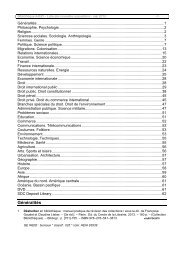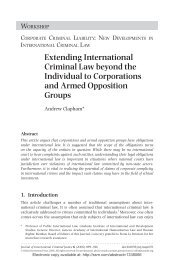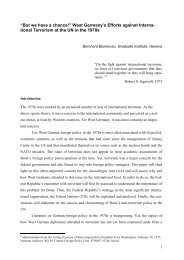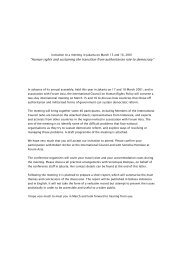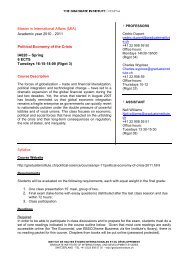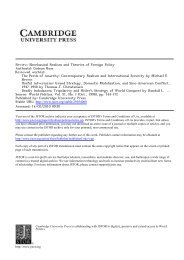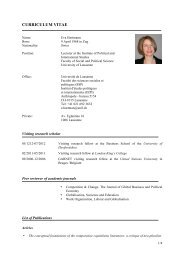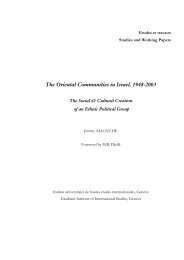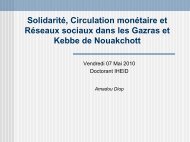Download - The Graduate Institute, Geneva
Download - The Graduate Institute, Geneva
Download - The Graduate Institute, Geneva
You also want an ePaper? Increase the reach of your titles
YUMPU automatically turns print PDFs into web optimized ePapers that Google loves.
SUMMARY<br />
<strong>The</strong> paper focuses on the way international law discourse deals with diplomatic<br />
assurances as a means for bypassing the principle of non-refoulement in the case of the<br />
prohibition of torture. <strong>The</strong> paper highlights how the effort to bypass the principle of nonrefoulement<br />
through diplomatic assurances raises serious questions concerning the<br />
normativity threshold in international law and illustrates how the normativity discourse is<br />
manipulated for different ends. After focusing on the way diplomatic assurances attempt to<br />
bypass the principle of non-refoulement, the paper examines the relevant practice of States<br />
seeking diplomatic assurances and the (negative) reactions of IOs and NGOs. It also analyzes<br />
the relevant case-law before concluding that it is not completely clear what is the legal scope<br />
of diplomatic assurances and whether they are binding, not binding or something in between.<br />
<strong>The</strong> paper highlights the dilemmas surrounding the binding/non-binding conundrum with<br />
regard to the protection of human rights.<br />
That brings us to the second part of the paper, which deals with the extraordinary<br />
challenge diplomatic assurances pose to the traditional views on the norm-creating process,<br />
especially as exemplified by soft law. After a brief presentation of the soft law doctrine, its<br />
content and its advantages/distinctive traits vis-à-vis the traditional sources of international<br />
law-making and the way it modifies our conception of normativity, we intend to analyze the<br />
classic form/intention debate when trying to determine the normative threshold. Using a<br />
broad definition of soft law that includes diplomatic assurances, the paper then turns to the<br />
way international lawyers have “tamed” soft law so that it can be admitted into the legal<br />
realm and how diplomatic assurances challenge this attitude.<br />
Firstly, soft law has been (grudgingly) identified and admitted into the international<br />
legal family through constructing it as a step towards normative expansion. In addition to<br />
this, discussion about soft law usually reproduces the usual normative vocabulary of<br />
compliance, enforcement, sanctions etc. making it difficult to distinguish it from hard law<br />
(legalization paradigm). Finally, the soft law paradigm has been associated with a<br />
communitarian project in international law and with the increased institutionalisation of the<br />
international legal order. We suggest that it is only under those conditions that soft law has<br />
been received in international law. Diplomatic assurances, however, neither follow the<br />
normative expansion paradigm (they are a clear sign of backtrack of the legal realm), nor have<br />
a communitarian allure (they are bilateral arrangements that even try to circumvent<br />
institutional monitoring authority), while the effort of IOs and NGOs to teeth diplomatic<br />
assurances simply highlights the limits of the normative gradation paradigm.<br />
<strong>The</strong> paper reaches the conclusion that the instrumentalisation of normativity,<br />
through the “greedy” and anarchical – to use two buzzwords of the last days – development<br />
of the soft law paradigm does not necessarily serve international law as diplomatic assurances<br />
prove. As far as the practice of diplomatic assurances in the war of terror is concerned, we<br />
sharply criticise the recourse of States to evil in order to present themselves as rescuers of<br />
their citizens and formalize a practice of discrimination and derogation from the torture<br />
prohibition. We also highlight, however, the agony of normativity of human rightists that<br />
impoverishes their juridical imagination and leads them to a technical and thus routinized<br />
reaction against diplomatic assurances.<br />
26


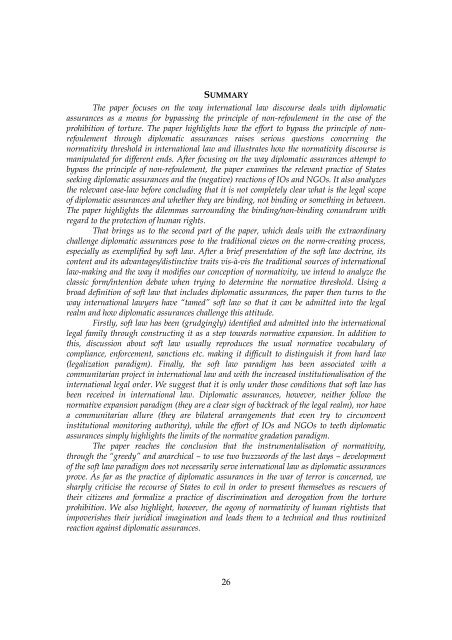
![Download [pdf] - The Graduate Institute, Geneva](https://img.yumpu.com/23370020/1/190x248/download-pdf-the-graduate-institute-geneva.jpg?quality=85)
